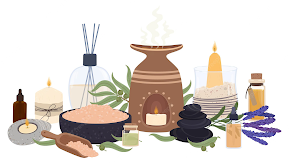Inhale Stresses and Exhale Serenity
The time has come to cover my favorite type of aromatherapy, olfactory. I practice this type of therapy daily since I have seen that it decreases my stress and migraine frequency.
 |
Image from Massage Magazine |
If anything helps to diminish my migraines, I am all for it, as a few of you can relate because migraines are the worst!
As the name suggests, this type of therapy involves inhaling essential oils. The difference between olfactory and incense is that essential oils can be put in a diffuser, cotton ball, candle, or spray to smell the aroma. As opposed to burning an incense product to release the aroma and smoke.
I use essential oils in a diffuser or on a cotton ball. For those who do not know how a diffuser works, you fill it up with water up to the indicated line. The water will help to distribute the aroma for a longer period and dilute the essential oils.
Image from iStock |
I use a few drops of one or a couple of different essential oils depending on my mood. For example, if I am studying, I use an essential oil blend that has a mixture of different aromas like peppermint, bergamot and lemon that helps me focus. Then I mix a few drops of grapefruit to boost my mood.
A few studies have been conducted regarding how olfactory aromatherapy impacts an individual's mood. Cynthia Deng mentioned in her 2011 Yale Scientific magazine publication that the University of Vienna found that when dental clinics used orange essential oil, it decreased female anxiety.
The Mie University School of Medicine also discovered that patients who suffered from depression needed smaller doses of antidepressants after using citrus fragrance treatments, as Deng noted.
Like the previous studies, others have shown that essential oils influence individuals' mood.
Image from Sites at Penn State |
Tracey Marks, a psychiatrist, explained in her video "Aromatherapy for Anxiety: How Does It Work?" that the essential oil scent travels to the back of your brain via the olfactory nerve in the back of your nose. From there, the scent moves through the hippocampus, the memory center, and then to the amygdala, the emotional center, as Marks described.
That is why aromatherapy plays a role in affecting an individual's mood. This becomes important when the type of memories you have are associated with certain scents because it will impact your mood.
For example, if you have a happy memory involving grapefruit, you will be happy when you smell it. This is due to the connections between the olfactory nerve, amygdala and hippocampus.
This type of aromatherapy is the best method. According to Emma Yasinski, a medical journalist, "Doctors suggest that if you try essential oils, it's best to smell them." Smelling them will make the impact happen faster, like a slingshot effect.
Sofia Herrera, a user of olfactory aromatherapy, said, "I enjoy using essential oils to help me relieve my stress. It's my way of relaxation and peace."
I agree with Herrera's experience because when I have a migraine, I can turn on my diffuser and take a few deep breaths to clear my head and be at peace.
 |
Image from Amazon |
From my experience, I can say that buying essential oil blends are better since you are getting a mixture of different scents for a specific purpose, like stress relief or focus.
Just like with any other practice, it is important to use it in moderation. Doctors recommend using this method for 30 minutes each day. If you are sensitive to scents, do not use this practice because it may increase stress.

Hi Jessica! This was great! I totally understood what you meant about smells working with memory. I've had moments where I was simply walking down the street and caught a whiff of something familiar and it triggered a very specific memory. It's crazy what smells can do! And I am also very much in love with my diffuser.
ReplyDeleteHi Jessica! This was a very interesting and informative. I had previously heard of aromatherapy but didn't know about different types or the science behind as to why they work. Good job, I was able to pick up on a lot of new information!
ReplyDeleteThis is a great post, Jessica! It was very informative- I didn't realize how effective this method was. I'm glad that this method of aromatherapy works for you! Also, thank you for the disclaimer at the end; I would love to try this, but I am unfortunately sensitive to scents.
ReplyDeleteI think this blog is going really well. You have lots of good information for your readers and I can hear your voice in what you've written. Keep it up.
ReplyDelete